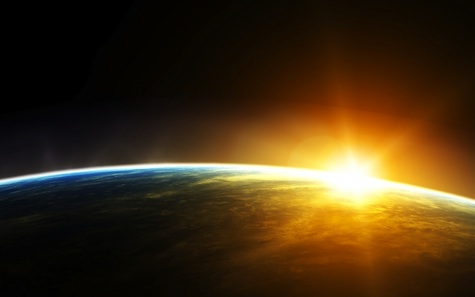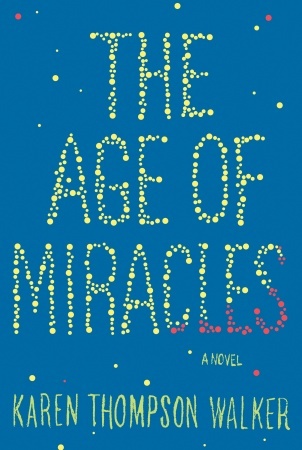Julia—the narrator of The Age of Miracles—is 11 years old when the world changes forever. It’s October, and time suddenly becomes elastic. One day, for no apparent reason, a day is suddenly 25 hours long. Three days later, 25:37—and they continue to stretch. The Age of Miracles has the feel of an apocalyptic To Kill a Mockingbird or a more sober True Grit, with a knowing, worldly voice-over guiding the reader through the moment in her childhood that everything changed. Author Karen Thompson Walker takes the traditional literary trope of nostalgia for the timelessness of youth and makes of it a weird, subtly creepy, and engrossing novel in which time itself is a thing to fear.
They call it “the slowing.” As scientists scramble to find causes and make predictions, governments also desperately search for a solution. If sunrise comes at a different time every day, when do the trains run? When does school start? In what is probably the most apt prediction in the book, the US government eventually chooses to just stick with a 24-hour clock. Nothing satisfies like the status quo! As daylight and “day-time” become divorced, social tensions erupt between those on Clock Time and those seeking to adapt to the new system (real-timers). In the meantime, gravity is running amok, UV radiation is no longer something you can control with well-applied sunscreen, and the sudden collapse of the avian ecosystem is only the harbinger of ecological disasters to come.
But these broader complications take a backseat to more immediate problems in Julia’s life. Her parents, already on edge, have new things to fight about: clock-time vs real-time, the government response, her father’s odd work hours becoming even more out of sync with the family life. Her best friend Hanna, whose Mormon family jubilantly goes off to celebrate the end of the world only to sheepishly return when the end proves itself not to actually be imminent, is no longer interested in hanging out with Julia. Her grandfather, already a conspiracy theorist, is becoming increasingly paranoid and unpredictable.

The only bright spot (pun intended) in her life is her relationship with Seth, the brooding boy next door. The shy girl and the dark boy may be a bit of a cliche, but their relationship has real resonance to it. Drunk on global change, struggling to become teenagers, their emotions have a tinge of desperation that will be immediately familiar to those of us for whom puberty was not a graceful time.
But make no mistake, this is far more than a coming-of-age novel with genre window-dressing. The slowing is a quiet catastrophe, an inexorable slide towards an unknown end. The mundane details become all-important, because they’re the only ones the characters have any control over. Through Julia we watch a world falling apart, a society trying to figure out how to live regular life in ever-changing, uncontrollable circumstances. Walker tenders the details of the developing catastrophe one by one in a steady creep of new horrors and revelations. There’s a tradition of Sun-based apocalypse (the film Sunshine and Ballard’s novel The Drowned World are two personal favorites) but no one, to my knowledge, has ever approached it from this angle before.
Our current fears—species extinction, cancer from radiation, the deterioration of the ozone layer, increasingly unstable weather patterns—are dialed up to 11 as the author takes things to their chillingly logical extremes.
Walker has an understated, writerly style, and more attention is given to the internal life of her characters than in your average genre mass-market. In the hands of another author, this plot could have had bigger, badder incidents; explosions and military intrigue and political mayhem galore. But that would have been a shame, because her subtleties serve the story well. The quietest moments in the book—a beach full of dying whales, a street of mansions slowly being submerged—are also the creepiest. No explosions are necessary to convey the intense despair of a world that suspects it is dying, but isn’t sure how exactly it will happen or how long it might take. And the ending (of which I will say nothing specific, because really you should read it for yourself) takes us just far enough forward to offer some answers, but is just vague enough to leave the reader haunted and thoughtful.
“It was, at the beginning, a quite invisible catastrophe,” Julia tells us in the opening pages. “I think this explains why what I felt first was not fear but a thrill. It was a little exciting—a sudden sparkle amid the ordinary, the shimmer of the unexpected thing.” I can come up with no better phrase to describe the appeal of The Age of Miracles than the author’s own words—it’s a novel with a shimmer, an unexpected thing.
Jenn Northington has been a bookseller since 2005, and is currently the events manager at WORD in Brooklyn. She also writes for Book Riot, is a founding member of the Bookrageous podcast, and aspires to be a big damn hero when she grows up.










